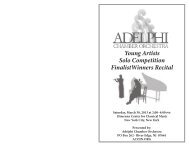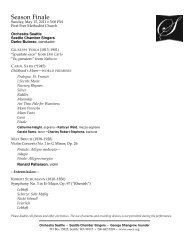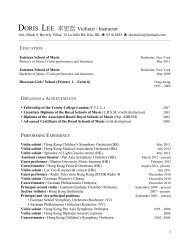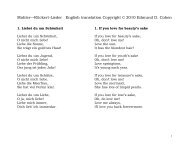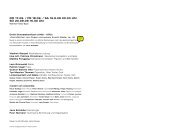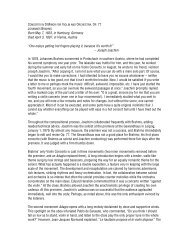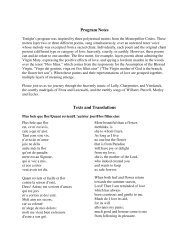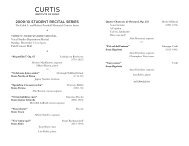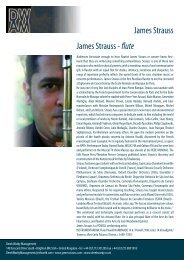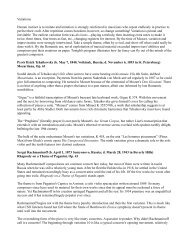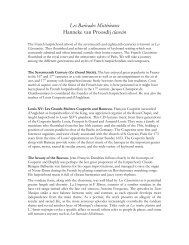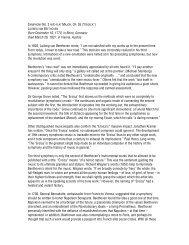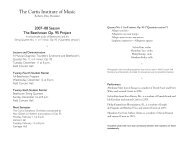Der fliegende Holländer - InstantEncore
Der fliegende Holländer - InstantEncore
Der fliegende Holländer - InstantEncore
You also want an ePaper? Increase the reach of your titles
YUMPU automatically turns print PDFs into web optimized ePapers that Google loves.
Dutchmans<br />
by Keith Warner<br />
for Lionel<br />
The fascinating thing about The flying<br />
Dutchman is how, standing as it does at<br />
the portal of one of the greatest careers in<br />
drama and music, it contains the essence<br />
of each of Wagner’s later artistic traits and<br />
how, in every work that follows, he pulls the<br />
strands that he begins to weave here almost<br />
to breaking point in each direction. You can<br />
easily spot these tonight and imagine where<br />
they might lead.<br />
The first miracle is the way in which the<br />
composer of Die Feen (The Fairies), Das<br />
Liebesverbot (The Ban on Love, a somewhat<br />
unrecognisable version of Shakespeare’s<br />
Measure for Measure) and that monument<br />
of bombast, Rienzi, the three operas that<br />
preceded The flying Dutchman, transformed<br />
himself into the sophisticated musical<br />
dramatist who created tonight’s opera.<br />
These pieces are, of course, competent,<br />
and Rienzi rather more than that, but they<br />
are also derivative of other genre pieces that<br />
Wagner grew up hearing and seeing. They<br />
show the facility but not the spark that ignites<br />
the genius within The flying Dutchman. But<br />
this ‘copycat’ servitude, or apprenticeship, is<br />
a first clue to Wagner’s metamorphosis. Just<br />
as in Hamlet Shakespeare takes a hugely<br />
popular genre of his day, Revenge Tragedy,<br />
and transforms it beyond recognition (so,<br />
too, Kubrick with the horror film in The<br />
Shining – perhaps a more apt parallel in<br />
subject and impact), so Wagner will take<br />
the magical, mythical, historical operas (and<br />
plays) of his early years, all cheap thrills<br />
and fairies galore, and exploit their popular<br />
entertainment value, at the same time adding<br />
levels of complexity, musical and dramatic,<br />
hitherto unachieved by others.<br />
Throughout all his operas, dwarves and<br />
dragons, love potions, exotic, erotic<br />
gardens and all manner of melodramatic<br />
paraphernalia will be ripped from their roots<br />
in the Schauerromantik (Horror-Romantic)<br />
literature of his youth and be replanted into<br />
a symbolic, psychological framework.<br />
The persona of the Dutchman himself<br />
jumps directly out of one of Marschner’s<br />
operas such as <strong>Der</strong> Vampyr or Hans Heiling,<br />
two baritone title roles of doomed, halfmortal<br />
men-monsters, though the musical<br />
colour-painting of sea and spectres is<br />
learnt more from Weber’s Oberon and <strong>Der</strong><br />
Freischütz. On the other hand, the in-depth<br />
psychology is wholly new. In those other<br />
operas, the anti-heroes are spooks because<br />
they’re damned, cursed, beyond the pale;<br />
the Dutchman, even though he curses<br />
God and is forced to wander the earth as<br />
punishment, is made a spook because<br />
he is all too human, the plaything of God.<br />
Dutchmans 9<br />
The psychology is<br />
embedded in the<br />
music and the text<br />
LLO Dutchman_aw.indd 9 18/11/08 15:09:17



